In the silent cinema artists and their models were a popular subject. Some films focused on Svengali-like artists who victimised the poor girls who posed for them. Sometimes the artists were destroyed by their beautiful and cunning muses. Twelve film star postcards to remember us that the creation of art can start a tragedy.
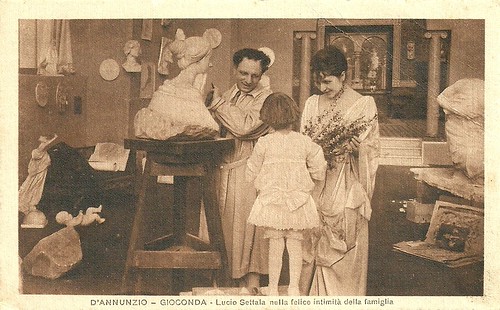
Italian postcard by IPA CT, no. 3654, V. Uff. Rev. St., Terni. Photo: Ambrosio. Caption: 'Lucio Settala in the happy intimacy of the family.' Postcard for the lost Ambrosio production La Gioconda (Eleuterio Rodolfi, 1916, released 1917), based on Gabriele D'Annunzio's play. Umberto Mozzato as Settala and Mercedes Brignone as his wife Silvia.
Famous sculptor Lucio Settala (Umberto Mozzato) lives on the Tuscan coast with Silvia and their daughter Beata. At a Fine Arts exhibition, Lucio encounters the beautiful femme fatale Gioconda Dianti (Helena Makowska). She becomes his model for a statue of a female nude in an ecstatic pose.
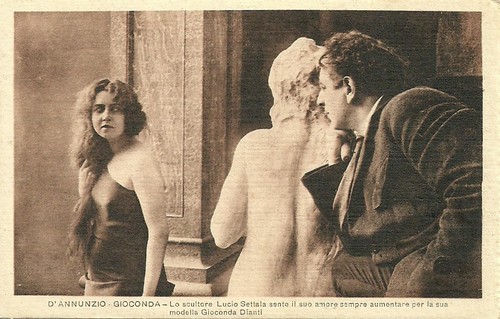
Italian postcard by IPA CT, no. 3877, V. Uff. Rev. St., Terni. Photo: Ambrosio. Caption: 'Sculptor Lucio Settala feels his love for his model Gioconda Dianti is ever expanding.' Umberto Mozzato as Lucio Settala and Helena Makowska as Gioconda Dianti.
More and more, Lucio falls in love with Gioconda and neglects his wife and child. Instead of his angelic wife (Brignone), keeper of family values, he prefers his seductive mistress, the inspiration to his art. His wife suffers in silence.
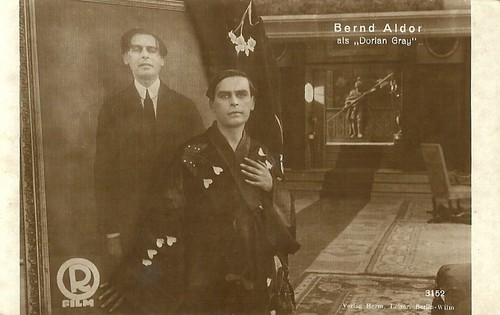
German postcard by Hermann Leiser Verlag, Berlin, no. 3152. Photo: Richard-Oswald-Produktion. Bernd Aldor in Das Bildnis des Dorian Gray (Richard Oswald, 1917), an early German adaptation of Oscar Wilde's famous novel The Picture of Dorian Gray.
Dorian Gray is the subject of a full-length portrait in oil by Basil Hallward. Understanding that his beauty will fade, the hedonistic Dorian expresses the desire to sell his soul, to ensure that the picture, rather than he, will age and fade. The wish is granted, and Dorian pursues a libertine life of varied and amoral experiences, while staying young and beautiful; all the while his portrait ages and records every soul-corrupting sin.
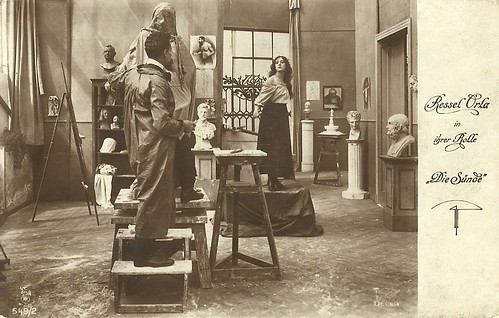
German postcard by Rotphot in the Film Sterne series, no. 549/2. Photo: Decla. Ressel Orla in Die Sünde/The Sin (Alwin Neuss, 1917).
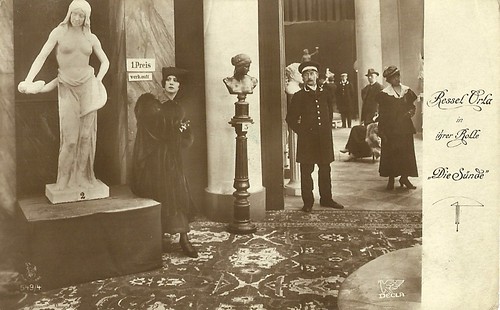
German postcard by Rotphot in the Film Sterne series, no. 549/4. Photo: Decla. Ressel Orla in Die Sünde/The Sin (Alwin Neuss, 1917).

German postcard by Rotophot in the Film Sterne series, no. 516/2. May Film. Photo: May. Mia May and Bruno Kastner in the German silent film Ein Lichtstrahl im Dunkel/A Ray of Light in the Dark (Joe May, 1917).
Count Gerd Palm (Kastner) is known for his flattering portraits of his models, so countess Lydia von Grabor (May), who has a hideous nose, asks him to paint her. Gerd sees through her facade and paints her as a lovely mother. He is so enchanted by a song from her that he asks her marry him. Lydia cannot believe him, so he flees. Years pass, the counts has her nose operated, and returns to Gerd, but discovers he has become blind. Dressed as a nurse she takes care of him. Her care makes him retake his work. He hears she is now ready to marry him, but when he still doubts she sings the song she once sang for him and they finally unite.
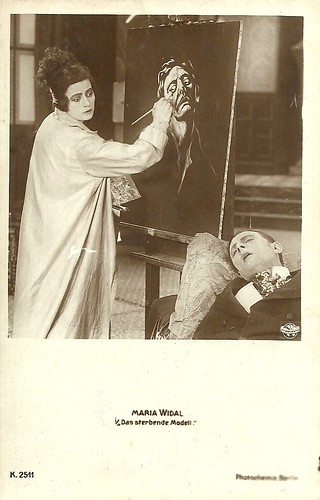
German postcard by Photochemie, no. K2511. Photo: Saturn-Film. Maria Widal in Das sterbende Modell/The dying model (Urban Gad, 1918).
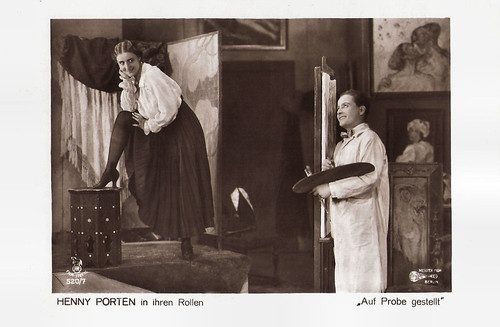
German postcard in the Film Sterne series by Rotophot, no. 520/7. Photo: Messter Film, Berlin. Henny Porten and Hermann Thimig in Auf Probe gestellt/Put to the test (Rudolf Biebrach, 1918).
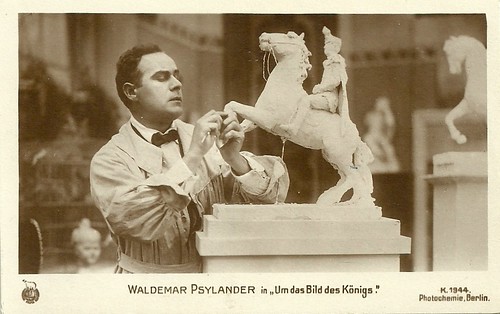
German postcard by Photochemie, Berlin, K. 1944. Photo: Nordisk Films. Valdemar Psilander in Rytterstatuen (A.W. Sandberg, 1919). The German title is Um das Bild des Königs (For the king's statue).

Italian postcard by Fotominio, no. 52. Photo: G.B. Falci, Milano. Italia Almirante in La statua di carne (Mario Almirante 1921). Noemi Keller (Almirante) notices the painted portrait of her lookalike Maria, who has died and whom the painter, count Paolo, is still loving, through Noemi.
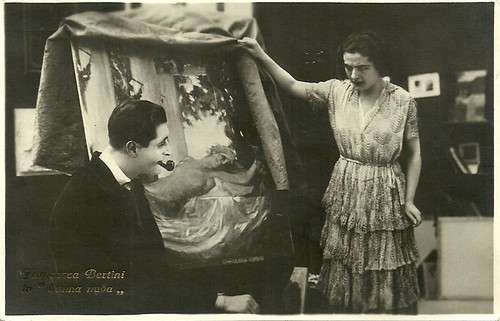
Italian postcard by La Fotominio / Ed. G.B. Falci, Milano, no. 115. Photo: Caesar Film. Francesca Bertini and Angelo Ferrari in the Henry Bataille adaptation La donna nuda (Roberto Roberti, 1922).

Italian postcard by Ed. Ballerini & Fratini, Firenze. Photo: Alba Film. Publicity still for L'ombra (Mario Almirante, 1923), starring Italian diva Italia Almirante as Berta, Liliana Ardea as Elena (left) and Alberto Collo as Berta's husband Gerardo (right). Caption: 'Berta's little friend and the daily painting lesson.'

An extra postcard. French postcard by A.N. Paris, no. 248. Photo: Production Natan. Publicity still of Pierre Batcheff in Education de prince (Henri Diamant-Berger, 1927).
This is a post for Postcard Friendship Friday, hosted by Beth at the The Best Hearts are Crunchy. You can visit her by clicking on the button below.


Italian postcard by IPA CT, no. 3654, V. Uff. Rev. St., Terni. Photo: Ambrosio. Caption: 'Lucio Settala in the happy intimacy of the family.' Postcard for the lost Ambrosio production La Gioconda (Eleuterio Rodolfi, 1916, released 1917), based on Gabriele D'Annunzio's play. Umberto Mozzato as Settala and Mercedes Brignone as his wife Silvia.
Famous sculptor Lucio Settala (Umberto Mozzato) lives on the Tuscan coast with Silvia and their daughter Beata. At a Fine Arts exhibition, Lucio encounters the beautiful femme fatale Gioconda Dianti (Helena Makowska). She becomes his model for a statue of a female nude in an ecstatic pose.

Italian postcard by IPA CT, no. 3877, V. Uff. Rev. St., Terni. Photo: Ambrosio. Caption: 'Sculptor Lucio Settala feels his love for his model Gioconda Dianti is ever expanding.' Umberto Mozzato as Lucio Settala and Helena Makowska as Gioconda Dianti.
More and more, Lucio falls in love with Gioconda and neglects his wife and child. Instead of his angelic wife (Brignone), keeper of family values, he prefers his seductive mistress, the inspiration to his art. His wife suffers in silence.

German postcard by Hermann Leiser Verlag, Berlin, no. 3152. Photo: Richard-Oswald-Produktion. Bernd Aldor in Das Bildnis des Dorian Gray (Richard Oswald, 1917), an early German adaptation of Oscar Wilde's famous novel The Picture of Dorian Gray.
Dorian Gray is the subject of a full-length portrait in oil by Basil Hallward. Understanding that his beauty will fade, the hedonistic Dorian expresses the desire to sell his soul, to ensure that the picture, rather than he, will age and fade. The wish is granted, and Dorian pursues a libertine life of varied and amoral experiences, while staying young and beautiful; all the while his portrait ages and records every soul-corrupting sin.

German postcard by Rotphot in the Film Sterne series, no. 549/2. Photo: Decla. Ressel Orla in Die Sünde/The Sin (Alwin Neuss, 1917).

German postcard by Rotphot in the Film Sterne series, no. 549/4. Photo: Decla. Ressel Orla in Die Sünde/The Sin (Alwin Neuss, 1917).

German postcard by Rotophot in the Film Sterne series, no. 516/2. May Film. Photo: May. Mia May and Bruno Kastner in the German silent film Ein Lichtstrahl im Dunkel/A Ray of Light in the Dark (Joe May, 1917).
Count Gerd Palm (Kastner) is known for his flattering portraits of his models, so countess Lydia von Grabor (May), who has a hideous nose, asks him to paint her. Gerd sees through her facade and paints her as a lovely mother. He is so enchanted by a song from her that he asks her marry him. Lydia cannot believe him, so he flees. Years pass, the counts has her nose operated, and returns to Gerd, but discovers he has become blind. Dressed as a nurse she takes care of him. Her care makes him retake his work. He hears she is now ready to marry him, but when he still doubts she sings the song she once sang for him and they finally unite.

German postcard by Photochemie, no. K2511. Photo: Saturn-Film. Maria Widal in Das sterbende Modell/The dying model (Urban Gad, 1918).

German postcard in the Film Sterne series by Rotophot, no. 520/7. Photo: Messter Film, Berlin. Henny Porten and Hermann Thimig in Auf Probe gestellt/Put to the test (Rudolf Biebrach, 1918).

German postcard by Photochemie, Berlin, K. 1944. Photo: Nordisk Films. Valdemar Psilander in Rytterstatuen (A.W. Sandberg, 1919). The German title is Um das Bild des Königs (For the king's statue).

Italian postcard by Fotominio, no. 52. Photo: G.B. Falci, Milano. Italia Almirante in La statua di carne (Mario Almirante 1921). Noemi Keller (Almirante) notices the painted portrait of her lookalike Maria, who has died and whom the painter, count Paolo, is still loving, through Noemi.

Italian postcard by La Fotominio / Ed. G.B. Falci, Milano, no. 115. Photo: Caesar Film. Francesca Bertini and Angelo Ferrari in the Henry Bataille adaptation La donna nuda (Roberto Roberti, 1922).

Italian postcard by Ed. Ballerini & Fratini, Firenze. Photo: Alba Film. Publicity still for L'ombra (Mario Almirante, 1923), starring Italian diva Italia Almirante as Berta, Liliana Ardea as Elena (left) and Alberto Collo as Berta's husband Gerardo (right). Caption: 'Berta's little friend and the daily painting lesson.'

An extra postcard. French postcard by A.N. Paris, no. 248. Photo: Production Natan. Publicity still of Pierre Batcheff in Education de prince (Henri Diamant-Berger, 1927).
This is a post for Postcard Friendship Friday, hosted by Beth at the The Best Hearts are Crunchy. You can visit her by clicking on the button below.

No comments:
Post a Comment